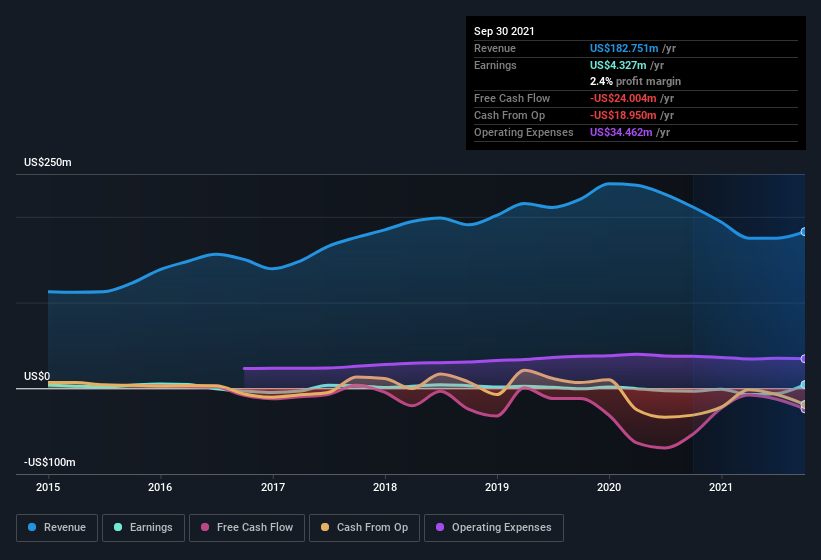- United States
- /
- Logistics
- /
- NasdaqCM:AIRT
There Are Some Holes In Air T's (NASDAQ:AIRT) Solid Earnings Release
Solid profit numbers didn't seem to be enough to please Air T, Inc.'s (NASDAQ:AIRT) shareholders. We think that they might be concerned about some underlying details that our analysis found.
View our latest analysis for Air T

A Closer Look At Air T's Earnings
As finance nerds would already know, the accrual ratio from cashflow is a key measure for assessing how well a company's free cash flow (FCF) matches its profit. In plain english, this ratio subtracts FCF from net profit, and divides that number by the company's average operating assets over that period. This ratio tells us how much of a company's profit is not backed by free cashflow.
Therefore, it's actually considered a good thing when a company has a negative accrual ratio, but a bad thing if its accrual ratio is positive. While having an accrual ratio above zero is of little concern, we do think it's worth noting when a company has a relatively high accrual ratio. That's because some academic studies have suggested that high accruals ratios tend to lead to lower profit or less profit growth.
For the year to September 2021, Air T had an accrual ratio of 0.25. We can therefore deduce that its free cash flow fell well short of covering its statutory profit. In the last twelve months it actually had negative free cash flow, with an outflow of US$24m despite its profit of US$4.33m, mentioned above. Coming off the back of negative free cash flow last year, we imagine some shareholders might wonder if its cash burn of US$24m, this year, indicates high risk. Having said that, there is more to the story. The accrual ratio is reflecting the impact of unusual items on statutory profit, at least in part.
Note: we always recommend investors check balance sheet strength. Click here to be taken to our balance sheet analysis of Air T.
The Impact Of Unusual Items On Profit
The fact that the company had unusual items boosting profit by US$8.7m, in the last year, probably goes some way to explain why its accrual ratio was so weak. While we like to see profit increases, we tend to be a little more cautious when unusual items have made a big contribution. When we crunched the numbers on thousands of publicly listed companies, we found that a boost from unusual items in a given year is often not repeated the next year. And, after all, that's exactly what the accounting terminology implies. Air T had a rather significant contribution from unusual items relative to its profit to September 2021. All else being equal, this would likely have the effect of making the statutory profit a poor guide to underlying earnings power.
Our Take On Air T's Profit Performance
Air T had a weak accrual ratio, but its profit did receive a boost from unusual items. Considering all this we'd argue Air T's profits probably give an overly generous impression of its sustainable level of profitability. If you'd like to know more about Air T as a business, it's important to be aware of any risks it's facing. For example, Air T has 4 warning signs (and 2 which are concerning) we think you should know about.
Our examination of Air T has focussed on certain factors that can make its earnings look better than they are. And, on that basis, we are somewhat skeptical. But there are plenty of other ways to inform your opinion of a company. Some people consider a high return on equity to be a good sign of a quality business. While it might take a little research on your behalf, you may find this free collection of companies boasting high return on equity, or this list of stocks that insiders are buying to be useful.
New: Manage All Your Stock Portfolios in One Place
We've created the ultimate portfolio companion for stock investors, and it's free.
• Connect an unlimited number of Portfolios and see your total in one currency
• Be alerted to new Warning Signs or Risks via email or mobile
• Track the Fair Value of your stocks
This article by Simply Wall St is general in nature. We provide commentary based on historical data and analyst forecasts only using an unbiased methodology and our articles are not intended to be financial advice. It does not constitute a recommendation to buy or sell any stock, and does not take account of your objectives, or your financial situation. We aim to bring you long-term focused analysis driven by fundamental data. Note that our analysis may not factor in the latest price-sensitive company announcements or qualitative material. Simply Wall St has no position in any stocks mentioned.
Have feedback on this article? Concerned about the content? Get in touch with us directly. Alternatively, email editorial-team (at) simplywallst.com.
About NasdaqCM:AIRT
Air T
Provides overnight air cargo, ground equipment sale, and commercial jet engines and parts in the United States and internationally.
Mediocre balance sheet and slightly overvalued.
Market Insights
Community Narratives




